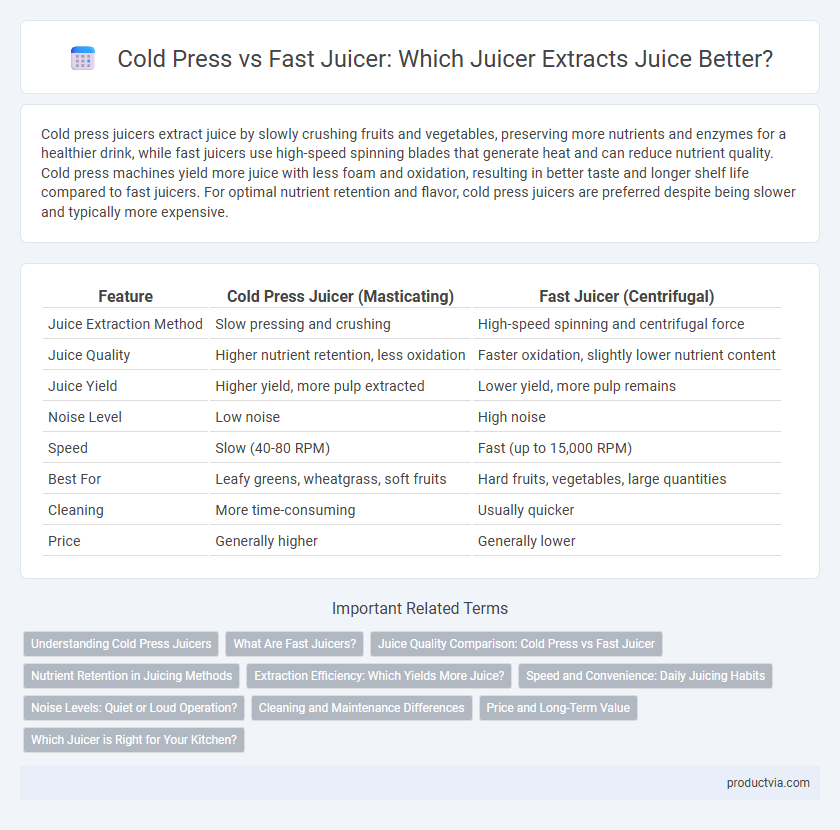Cold press juicers extract juice by slowly crushing fruits and vegetables, preserving more nutrients and enzymes for a healthier drink, while fast juicers use high-speed spinning blades that generate heat and can reduce nutrient quality. Cold press machines yield more juice with less foam and oxidation, resulting in better taste and longer shelf life compared to fast juicers. For optimal nutrient retention and flavor, cold press juicers are preferred despite being slower and typically more expensive.
Table of Comparison
| Feature | Cold Press Juicer (Masticating) | Fast Juicer (Centrifugal) |
|---|---|---|
| Juice Extraction Method | Slow pressing and crushing | High-speed spinning and centrifugal force |
| Juice Quality | Higher nutrient retention, less oxidation | Faster oxidation, slightly lower nutrient content |
| Juice Yield | Higher yield, more pulp extracted | Lower yield, more pulp remains |
| Noise Level | Low noise | High noise |
| Speed | Slow (40-80 RPM) | Fast (up to 15,000 RPM) |
| Best For | Leafy greens, wheatgrass, soft fruits | Hard fruits, vegetables, large quantities |
| Cleaning | More time-consuming | Usually quicker |
| Price | Generally higher | Generally lower |
Understanding Cold Press Juicers
Cold press juicers, also known as masticating juicers, extract juice by slowly crushing fruits and vegetables, preserving more nutrients and enzymes compared to fast juicers that use high-speed spinning blades. This slow extraction process minimizes heat and oxidation, resulting in higher-quality juice with better flavor and longer shelf life. Cold press juicers are ideal for leafy greens, wheatgrass, and soft fruits, making them a preferred choice for health-conscious consumers seeking maximum nutrient retention.
What Are Fast Juicers?
Fast juicers, also known as centrifugal juicers, operate by rapidly spinning a blade to shred fruits and vegetables while simultaneously separating the juice from the pulp through centrifugal force. These juicers excel at processing a wide variety of produce quickly, making them ideal for users seeking speedy juice extraction. Although they generate more heat and oxidation than cold press juicers, advancements in blade design and speed control have improved juice quality and nutrient retention.
Juice Quality Comparison: Cold Press vs Fast Juicer
Cold press juicers extract juice by slowly crushing fruits and vegetables, preserving more nutrients, enzymes, and antioxidants, resulting in higher juice quality with richer flavor and enhanced freshness. Fast juicers, also known as centrifugal juicers, operate at high speeds and generate heat and oxidation, which can degrade some nutrients and reduce juice shelf life. Studies indicate cold-pressed juice maintains greater vitamin C levels and less foam, ensuring superior taste and health benefits compared to fast juicing methods.
Nutrient Retention in Juicing Methods
Cold press juicers utilize slow, crushing and pressing mechanisms that minimize heat buildup and oxidation, preserving maximum nutrients, enzymes, and antioxidants in the juice. Fast juicers, also known as centrifugal juicers, operate at high speeds with sharp blades, generating heat and exposing juice to more oxygen, which can degrade sensitive vitamins like vitamin C and polyphenols. For optimal nutrient retention, cold press juicing is superior, offering longer shelf life and higher quality juice compared to fast juicers.
Extraction Efficiency: Which Yields More Juice?
Cold press juicers, also known as slow or masticating juicers, extract juice by crushing and pressing fruits and vegetables, resulting in higher juice yield and better nutrient retention compared to fast juicers. Fast juicers or centrifugal juicers use high-speed spinning blades to shred produce, which tends to produce less juice and more foam due to oxidation and heat generation. Cold press juicers typically yield 10-20% more juice, making them more efficient for extracting maximum liquid from produce.
Speed and Convenience: Daily Juicing Habits
Cold press juicers extract juice slowly by crushing and pressing fruits and vegetables, preserving nutrients and enzymes but requiring more time and effort, ideal for health-conscious users with ample time. Fast juicers, also known as centrifugal juicers, operate quickly by shredding and spinning produce, delivering juice in seconds, making them convenient for busy individuals needing quick daily juicing. Speed and convenience heavily influence daily juicing habits, with fast juicers favored for morning routines and cold press juicers preferred for nutrient-rich, leisurely juicing sessions.
Noise Levels: Quiet or Loud Operation?
Cold press juicers operate quietly due to their slow, masticating mechanism that reduces motor noise, making them ideal for noise-sensitive environments. Fast juicers, or centrifugal juicers, run at high speeds, resulting in louder noise levels that can be disruptive during early mornings or shared living spaces. Choosing between a cold press and fast juicer depends on whether quiet operation or faster juice extraction is the priority.
Cleaning and Maintenance Differences
Cold press juicers generally have more components and require longer cleaning time due to their slow, masticating process that extracts juice by crushing and pressing. Fast juicers, also called centrifugal juicers, feature fewer parts and quicker cleanup, but often accumulate more pulp residue that can require frequent maintenance to prevent clogging. Both types benefit from immediate rinsing after use, though cold press models demand more thorough disassembly for optimal hygiene and longevity.
Price and Long-Term Value
Cold press juicers, though typically more expensive upfront, offer superior juice yield and nutrient retention, making them a cost-effective choice for long-term health benefits. Fast juicers, or centrifugal juicers, are generally more affordable initially but may produce less juice with lower nutrient density and require frequent replacement of parts. Investing in a cold press juicer provides enhanced durability and higher juice quality, delivering better long-term value despite the higher initial price.
Which Juicer is Right for Your Kitchen?
Cold press juicers use a slow, masticating process that preserves more nutrients and enzymes, ideal for those prioritizing juice quality and health benefits. Fast juicers, or centrifugal models, offer quick extraction with higher speed and convenience, perfect for busy kitchens needing immediate juice. Choosing the right juicer depends on your lifestyle: cold press suits nutrient-rich juice lovers, while fast juicers fit users looking for efficiency and speed.
Cold Press vs Fast Juicer for juice extraction Infographic

 productvia.com
productvia.com